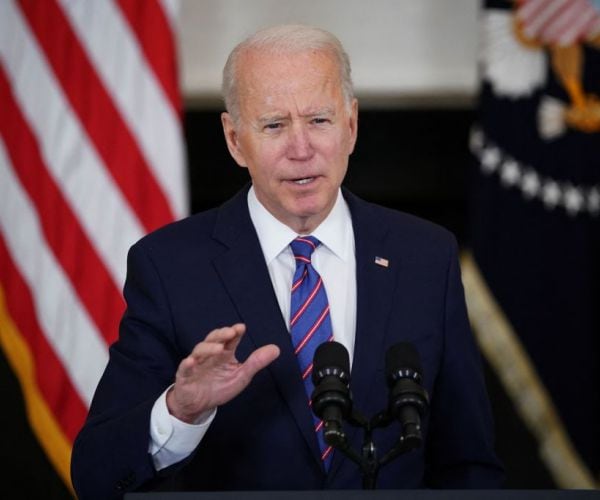Dick Morris Slams Infrastructure Bill as Ploy to Collectivize US
 US President Joe Biden speaks about the March jobs report in the State Dining Room of the White House in Washington, DC, on April 2, 2021. (Mandel Ngan/AFP via Getty)
US President Joe Biden speaks about the March jobs report in the State Dining Room of the White House in Washington, DC, on April 2, 2021. (Mandel Ngan/AFP via Getty)
President Joe Biden’s infrastructure proposal is meant to collectivize the nation, political strategist Dick Morris said Sunday in a harsh criticism of the bill.
Speaking on “The Cats Roundtable” radio show hosted by John Catsimatidis on WABC 770 AM, Morris, a former adviser to President Bill Clinton, said Biden’s infrastructure package is "designed to collectivize the United States, to regiment us, to unionize us, and to make us controllable and tractable as an economy.”
Stressing that “the metaphor that comes to mind is when Stalin insisted that all the farmers go to collective farms,” Morris cautioned that the main feature of the infrastructure legislation is that “you cannot get those funds unless you unionize. Davis-Bacon will control all of that spending. You have to have a union for your company to qualify. That’s going to force the entire construction industry and huge numbers of other industries into unionization.”
He also emphasized that Biden intends to make the Protecting the Right to Organize (PRO) Act part of the legislation bill, which he said would “be the greatest disaster we’ve ever had.”
Morris warned that the general public does not yet know about the PRO Act, but said that the end result would be that “nobody can work for themselves. Everybody has to be on a corporate payroll. If you are a consultant or a contractor or a freelancer, you have to close up shop and become an employee of your client or the people you contract with.”
He said that this means that some “30 to 40 million people who make their living that way are going to have to be now on payroll,” stressing that such a law is already in effect in California and has “totally deformed the economy” of that state.
Morris said that the overall goal of Biden’s strategy on this legislative package is “to organize our economy for more efficient government control. It sounds like in Germany where everybody basically works for a few large companies and there are only one or two large unions that represent everybody.”





.jpeg)
Comments
Post a Comment